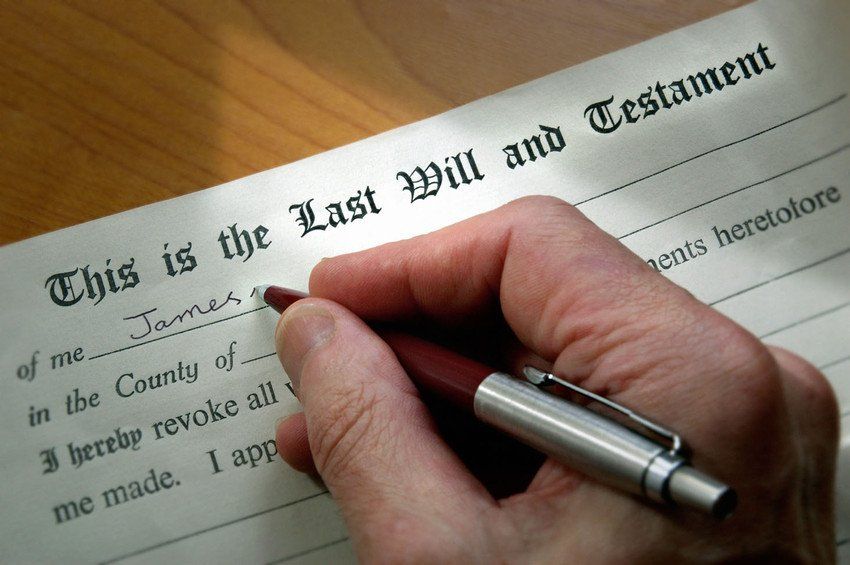Everything You Need to Consider When Writing a Will
- By Smalleys Solicitors
- •
- 23 Dec, 2020
- •

It can be difficult to think about what will happen after we’re gone, but it’s vital to have your affairs in order and writing a will is an important part of this process. A will is a legal document which lays out how you’d like your assets to be divided after your death and it offers peace of mind that you loved ones will be taken care of.
If you pass away without a will, then your assets will be divided in accordance with the law and this may not align with your wishes. It can also cause additional stress for your family if they need to spend valuable time and money contesting the decisions made by the law. There are many good reasons to make a will, but if you’ve not considered doing so before, you may not know where to start.
There are several things to consider when writing a will, including the type of will you need, deciding who your beneficiaries will be, and appointing an executor to oversee the process. Seeking legal help and advice is a great place to start once you’re ready to write your will, but if you want to know more to help you prepare, read on for our handy guide.
Making a will is important for everyone, not just those who are wealthy or have a wide range of assets. One of the most straightforward reasons to make a will is that it lets you decide how your assets are divided up. This could include monetary savings, property and personal possessions (collectively known as your estate), and a will lays out exactly who gets what.
Making a will also safeguards any children under 18, or any other family members who depend on you financially. A will allows you to name a guardian(s) to care for any children after you’re gone and you can also ensure that they inherit any assets you want to pass on. Writing a will can also help to reduce the amount of inheritance tax payable on any property or large sums of money left behind. It’s a good idea to seek legal advice if you’re looking to save on inheritance tax and a professional solicitor will be able to explain any exemptions which may be available.
As well as the practical considerations, a will simply offers you the peace of mind that your loved ones will be taken care of. Don’t leave things to chance and let the law decide, as you can’t assume that your assets will be divided up in the way that you would choose. Making a will in advance ensures all your affairs are in order and you can be confident that friends and family will receive what you’ve chosen.
There are several different types of will available depending on your circumstances. It’s important to choose a will that’s best for you, so see below to find out more about the most common types of will.
This is the most common type of will used by an individual person to outline their wishes, but you don’t have to be single to make a single will. Many married people use single wills if their wishes differ to that of their partner, so the choice is up to you. Single wills are particularly popular among married people who have children from a previous relationship, as you can choose to divide your estate between your children and spouse.
A single will details how your assets (such as property and savings) will be divided up, but it can also contain plans for your funeral and how you’d like personal possessions to be distributed.
As the name suggests, these wills ‘mirror’ each other and are designed for couples who have the same wishes. In most cases, the entire estate passes to the surviving spouse once the other passes away, then after they die, the estate is distributed according to the instructions in the will.
Although the documents are drawn up at the same time, be aware that either partner can change their will at any time. There also needs to be a high degree of trust involved as the surviving spouse could change their will following your death and the new terms may not reflect your original wishes.
A trust will offers increased protection for your assets and gives you more flexibility over how they’re managed. Trust wills allow a third party (known as a trustee) to manage your estate on behalf of beneficiaries (usually minor children). Most people lay out conditions for how and when the beneficiaries will receive any money or property left to them; for example once they turn 18 or finish their education.
Creditors are also unable to access any funds or property left in a trust, which provides extra security for anyone in debt or facing bankruptcy.
Also known as advance decisions, this type of will covers personal decisions about medical treatment and end of life care. It lays out what you may want - or don’t want - towards the end of your life and a living will is consulted once you can no longer communicate decisions for yourself. It may include aspects like whether you want to be resuscitated, the type of pain medication you’re comfortable with and whether you’re happy for organs to be donated.
Your assets make up what’s known as your estate and this is what will be divided up between loved ones. It’s a good idea to get help from a law firm or will writing service when drawing up a list of your assets and any debts. They can help to make sure everything is included and give you an idea of the value of your estate.
Assets that typically make up an estate include:
● Your home and any other property you may own (e.g a second home abroad, commercial premises or rental properties)
● Savings in bank or building society accounts
● Pension funds and insurance
● Investments such as stocks and shares
● Vehicles
● Furniture and other household items
● Personal items such as jewellery, artwork and antiques.
Experts recommend that you get your assets valued regularly as their value can change over time.
How do I want to divide my assets?
Once you’ve identified all the assets that make up your estate, you’ll need to decide how you’d like them to be divided up. Think about who you want to benefit from your will, including family members, friends or any charities that are important to you. You can also allocate personal possessions or gifts which may have sentimental value to a specific person. You’ll need to appoint an executor too; this is an individual named in your will who will be responsible for dividing up your estate.
In most cases, funeral and administrative expenses are deducted from the value of your estate, as well as any outstanding taxes or debts that are owed. What’s left is known as the residue of the estate and it’s this which will be divided up amongst the people named in your will. How you divide your estate is highly personal; some people decide to leave everything to their children, or you may want to donate a lump sum to charity. You’ll also need to think about what will happen if any beneficiaries die before you and who would inherit their share.
Professional will writing services in Nottingham - From the experts at Smalleys Solicitors
If you’ve been thinking about writing your will and are in need of professional help and advice, get in touch with the expert team at Smalleys Solicitors. We offer all the estate planning services you need to ensure that your assets are taken care of and your loved ones receive what’s intended. If you’re unable to come to our offices in person, we’ll come to you to make a note of your wishes before drafting all the necessary paperwork.
We understand the will writing can be complicated, but our team is on hand to guide you through every step of the way. We can also advise you on how to reduce inheritance tax or set up a trust to ensure your assets are well protected. For more information about our will writing services or to book an appointment, give us a call today on 0115 955 6555 or contact us via our website.











